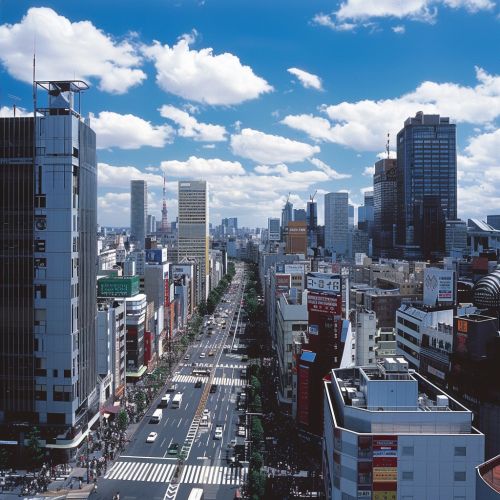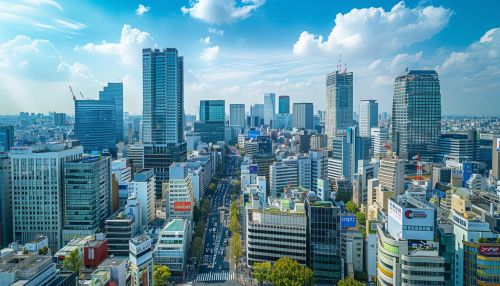Shinjuku
Overview
Shinjuku (新宿区, Shinjuku-ku) is a special ward in Tokyo, Japan. It is a major commercial and administrative center, housing the busiest railway station in the world, Shinjuku Station, and the Tokyo Metropolitan Government Building, which is the center of administration for the Tokyo Metropolis. Shinjuku is known for its vibrant nightlife, shopping districts, and diverse cultural offerings, making it one of the most dynamic areas in Tokyo.
History
Early History
Shinjuku's history dates back to the Edo period when it was a post town on the Kōshū Kaidō, one of the five routes of the Edo period. The area was initially a rural region but began to develop as a commercial hub due to its strategic location. The name "Shinjuku" means "New Inn" and was derived from the establishment of new inns to accommodate travelers.
Meiji Period
During the Meiji period, Shinjuku underwent significant urban development. The opening of the Yamanote Line in 1885 and the Chūō Main Line in 1889 transformed Shinjuku into a major transportation hub. The area saw rapid industrialization and urbanization, leading to the establishment of various commercial enterprises.
Post-War Development
After World War II, Shinjuku emerged as a key commercial and entertainment district. The reconstruction efforts led to the development of high-rise buildings, shopping centers, and entertainment venues. The area became a symbol of Japan's post-war economic recovery and modernization.
Geography
Shinjuku is located in the western part of the Tokyo Metropolis. It is bordered by the special wards of Chiyoda, Bunkyō, Toshima, Nakano, Shibuya, and Minato. The ward covers an area of 18.23 square kilometers and is characterized by a mix of commercial, residential, and green spaces.
Notable Districts
- **Kabukichō**: Known as Tokyo's red-light district, Kabukichō is famous for its nightlife, host and hostess clubs, and entertainment venues.
- **Golden Gai**: A small area with narrow alleys and tiny bars, Golden Gai is renowned for its unique atmosphere and vibrant nightlife.
- **Omoide Yokocho**: Also known as "Memory Lane," this area is famous for its traditional izakayas and yakitori restaurants.
- **Shinjuku Gyoen**: A large park that offers a serene escape from the bustling city, featuring traditional Japanese gardens, English landscape gardens, and French formal gardens.


Economy
Shinjuku is one of Tokyo's major economic centers. It hosts the headquarters of numerous multinational corporations, financial institutions, and retail giants. The area is also a hub for the information technology and telecommunications industries.
Commercial Districts
- **Shinjuku Station Area**: The vicinity around Shinjuku Station is a bustling commercial district with numerous department stores, electronics retailers, and fashion boutiques.
- **Nishi-Shinjuku**: Known for its skyscrapers, Nishi-Shinjuku is home to many corporate headquarters and high-end hotels.
- **Takadanobaba**: A student district with numerous educational institutions, bookstores, and affordable eateries.
Transportation
Shinjuku is a major transportation hub, offering extensive connectivity through various modes of transport.
Railways
- **Shinjuku Station**: The busiest railway station in the world, serving over 3.5 million passengers daily. It is a major interchange for several lines, including the JR Yamanote Line, Chūō Main Line, and the Tokyo Metro Marunouchi Line.
- **Seibu-Shinjuku Station**: Serves the Seibu Shinjuku Line, providing access to the western suburbs of Tokyo.
- **Tokyo Metro**: The Tokyo Metro network has several stations in Shinjuku, including Shinjuku-sanchome and Higashi-Shinjuku.
Bus Services
Shinjuku is well-served by local and long-distance bus services. The Shinjuku Expressway Bus Terminal, located near Shinjuku Station, offers connections to various destinations across Japan.
Culture
Shinjuku is a cultural melting pot, offering a diverse range of cultural experiences.
Theatres and Cinemas
- **Shinjuku Koma Theater**: A historic theater known for its kabuki performances.
- **Toho Cinemas Shinjuku**: A modern cinema complex featuring the latest films and IMAX screenings.
Museums and Galleries
- **Samurai Museum**: Offers insights into the history and culture of the samurai.
- **Seiji Togo Memorial Sompo Japan Nipponkoa Museum of Art**: Features a collection of Western and Japanese art.
Education
Shinjuku is home to several prestigious educational institutions.
Universities
- **Waseda University**: One of Japan's top private universities, known for its strong emphasis on research and international exchange programs.
- **Tokyo Medical University**: A leading medical school offering comprehensive medical education and research opportunities.
Schools
Shinjuku has a range of public and private schools, catering to both local and international students. The ward also offers various vocational and language schools.
Demographics
As of the latest census, Shinjuku has a population of approximately 350,000 residents. The ward is known for its diverse population, including a significant number of foreign residents. The demographic composition reflects a mix of age groups, with a notable presence of young professionals and students.
Government and Administration
The Tokyo Metropolitan Government Building, located in Nishi-Shinjuku, serves as the administrative center for the Tokyo Metropolis. The Shinjuku Ward Office oversees local administrative functions, including public services, urban planning, and community welfare.
Urban Development
Shinjuku is characterized by its dynamic urban landscape, featuring a mix of modern skyscrapers and traditional buildings. The ward has undergone several phases of urban redevelopment, aimed at enhancing infrastructure, public spaces, and environmental sustainability.
Skyscrapers
Shinjuku is home to some of Tokyo's tallest buildings, including:
- **Tokyo Metropolitan Government Building**: A twin-tower complex offering panoramic views of the city.
- **Shinjuku Park Tower**: A mixed-use skyscraper housing offices, a hotel, and retail spaces.
- **Mode Gakuen Cocoon Tower**: An iconic educational building with a unique cocoon-shaped design.
Environmental Initiatives
Shinjuku has implemented various environmental initiatives to promote sustainability and reduce carbon emissions. These include the development of green spaces, energy-efficient buildings, and waste management programs.
Healthcare
Shinjuku offers a comprehensive range of healthcare services, including hospitals, clinics, and specialized medical centers. Notable healthcare institutions in the ward include:
- **Keio University Hospital**: A leading medical facility offering advanced medical treatments and research.
- **Tokyo Medical University Hospital**: Provides a wide range of medical services and is known for its expertise in various medical fields.
Tourism
Shinjuku is a major tourist destination, attracting millions of visitors annually. The ward offers a wide range of attractions, including shopping, dining, entertainment, and cultural experiences.
Shopping
- **Isetan Shinjuku**: A luxury department store offering high-end fashion, cosmetics, and gourmet food.
- **Takashimaya Times Square**: A large shopping complex featuring a variety of retail stores, restaurants, and entertainment options.
Dining
Shinjuku boasts a diverse culinary scene, offering everything from traditional Japanese cuisine to international dishes. Notable dining areas include:
- **Omoide Yokocho**: Known for its traditional izakayas and yakitori restaurants.
- **Golden Gai**: Offers a unique dining experience with its tiny bars and eateries.
